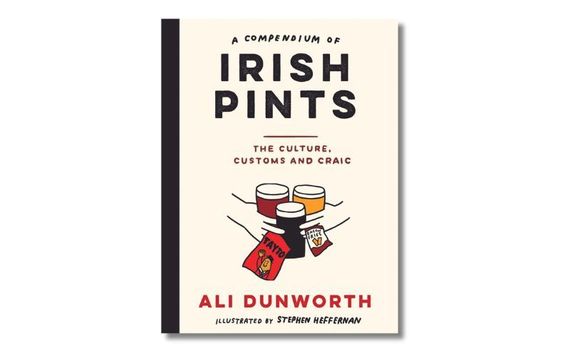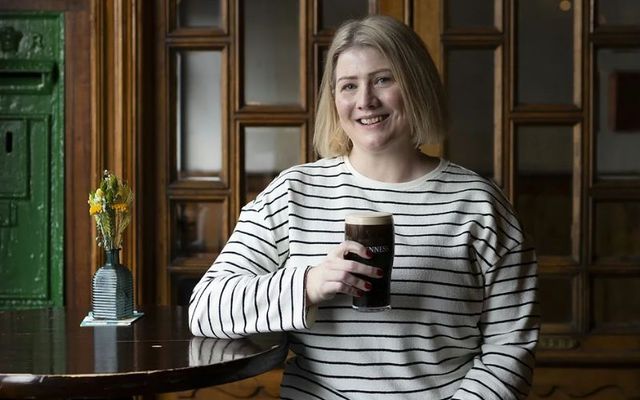Ali Dunworth explores the culture, customs and craic surrounding pints in Ireland in her new book "A Compendium of Irish Pints". In this extract, she explores the complex relationship between the Irish and "Funeral Pints".
When I sat down to write my book, "A Compendium of Irish Pints", I tried to list all the occasions we have for a pint in Ireland it struck me that the essential pint moments in life aren’t too dissimilar to the sacraments of the Catholic church: first pints, wedding pints, funeral pints. Ecumenical pints if you will.
I know, I know, most of us will think of the TV show "Father Ted" when we say "ecumenical". "That would be an ecumenical matter, Father!" was a favorite coverall answer the priests in "Father Ted" liked to use and it’s become a catchphrase in its own right. But the actual definition of ecumenical is "of or relating to the Christian Church throughout the world, especially with regard to its unity".
So when I talk about ecumenical pints, I’m referring to all the opportunities for pints that the Christian Church, in particular the Catholic Church, affords us. There are so many holy days, religious days and holidays that, let’s face it, we find a place for a drink – at least in Ireland, anyway. And without getting too philosophical (or should I say ecumenical?) about the whole thing, the Catholic Church based most of their celebrations and sacraments around pagan rituals that already existed, so are they really even ecumenical to begin with?
I realise we’re here to talk about pints and not mass but there is simply no getting away from the church references. Wetting the baby’s head, communions, and confirmations, we’ll always find a place for a pint. Then there was the whole Good Friday situation and let's not forget Holy Hour which if you’re in the Church, refers to a devotional tradition of spending an hour in Eucharistic adoration in the presence of the Blessed Sacrament.
But if you were in or near a pub in Ireland from the 1920s up until 2000, it meant you could be kicked out in the middle of the day. The more I researched pints the more the parallels between the pub and the church became apparent.
There’s a brilliant book I read by Kevin C. Kearns called "Dublin Pub Life and Lore – An Oral History of Dublin's Traditional Irish Pubs: The Recollections of Dublin's Publicans, Barmen and 'Regulars'" where he really nails this:
“One cannot ignore the religious symbolisms associated with the public house-the barman was long known as the ‘curate’; afternoon closing time was the ‘holy hour’; snugs were termed ‘confession boxes’; a black pint of Guinness with its white collar is called the ‘parish priest’; regulars are the ‘faithful’; persons barred feel ‘excommunicated’; pubs closed to women were the ‘holy ground’; privileged bar space was the ‘inner sanctum’; and when notorious pubman Brendan Behan would crawl from pub to pub he proclaimed he was ‘doing the stations of the cross’. Which of these two revered institutions, the church or the pub, is more indispensable to modern life is open to lively philosophical debate.”
When it comes to impacting the nation these days, shaping public opinion, and fostering unity, the pub can easily rival the pulpit for influence. In modern Ireland, the pub boasts a far greater number of establishments than the church. The pub is still very much part of contemporary society whereas the interest in the church, well that’s very much been waning. But there’s no getting away from their intermingling. And that’s never more evident than when it comes to funerals.

"A Compendium of Irish Pints" by Ali Dunworth.
Pubs, pints and funerals. They have a long and storied past in Ireland. For a long time, it wasn’t just beers you could be served, but also a burial. Publicans often ran an undertaking business alongside their usual trade and in fact, up until 1962, all publicans were technically obliged to store dead bodies. This legal obligation stemmed from the Coroners Act of 1846, which dictated that dead bodies should be brought to the nearest "tavern, public house, or house licensed for the sale of spirits”. It made practical sense you see because pubs usually had cold storage perfect for preserving bodies. It helped that funerals were good for business too so many publicans also had a sideline in the undertaking businesses. It’s no wonder we have a unique relationship with funerals in Ireland.
Death is not something we shy away from. Death, dead, dying. It’s not whispered. We aren’t afraid of it. Local radio stations broadcast death notices a few times a day. Most of us will have known a grandparent or parent who listened or still listens. Or perhaps they’ve moved on to RIP.ie, a website that lists deaths as they are announced. It’s a go-to daily check-up for plenty of Irish people of a certain generation – like Facebook but for funerals.
Irish funerals are not the delicate, dressed-in-black events we see in American movies and TV. They are gatherings and are open to all. A wake at home might be a bit more low-key but you usually don’t need to be invited and you don’t need to dress in black. Anyone can show up, pay their respects, shake hands, share their condolences and depending on who they were to the deceased, be invited for hospitality after. We have a set of traditions we like to follow, traditions that ground us and bind the bereaved to the dead. Hospitality – and in turn, drink – is a big part of that. Funeral hospitality could have a whole book to itself. It goes back to Brehon Law and Gaelic feasts. Providing a decent send-off, including food and drink, was – and still is – expected.
After the church and burial or cremation, there’s an expectation for ‘afters’ which is usually held at a hotel, a pub or even a GAA club. There is often it’s a sit-down meal. We even have a particular style of funeral food: triangle sandwiches, vegetable soup, maybe a carvery. And pints, of course. The afters, in whatever form, is an important part of the funeral and the grieving process. It offers a welcome distraction – the chance to talk, to reminisce, to share stories and to listen – which is much needed if you’re feeling hollow and helpless.
It’s a chance to continue commemorating the life of the departed. Ritually sharing and consuming a pint with someone can be the ideal antidote. In a way, it’s the perfect example of why I wanted to write my book. It’s not about the drink or the alcohol but rather everything else that surrounds it.
* Ali Dunworth is a writer, journalist, consultant and events curator who loves writing and talking about food and drink so much that she’s made a career out of it. She started out working in hospitality before a career behind the scenes in food TV. As a freelance food, drink and travel writer, Ali contributes to the Irish Times, Food & Wine Magazine and many others. She also curates and hosts numerous Irish food events and festival stages. Find Ali on Instagram here @alidunworth.
"A Compendium of Irish Pints" by Ali Dunworth will be published on May 7, 2024. For more visit NineBeanRowsBooks.com.




Comments